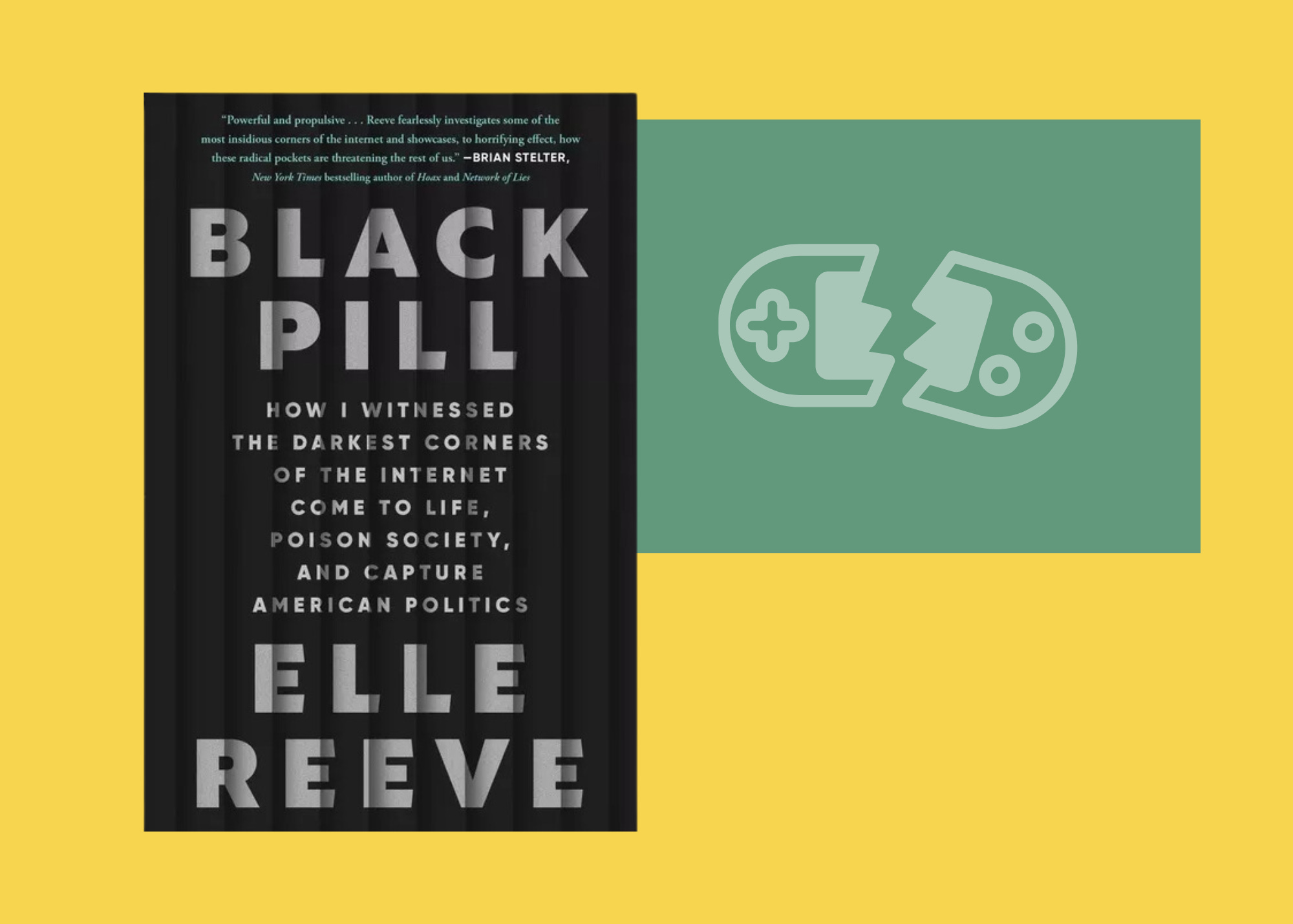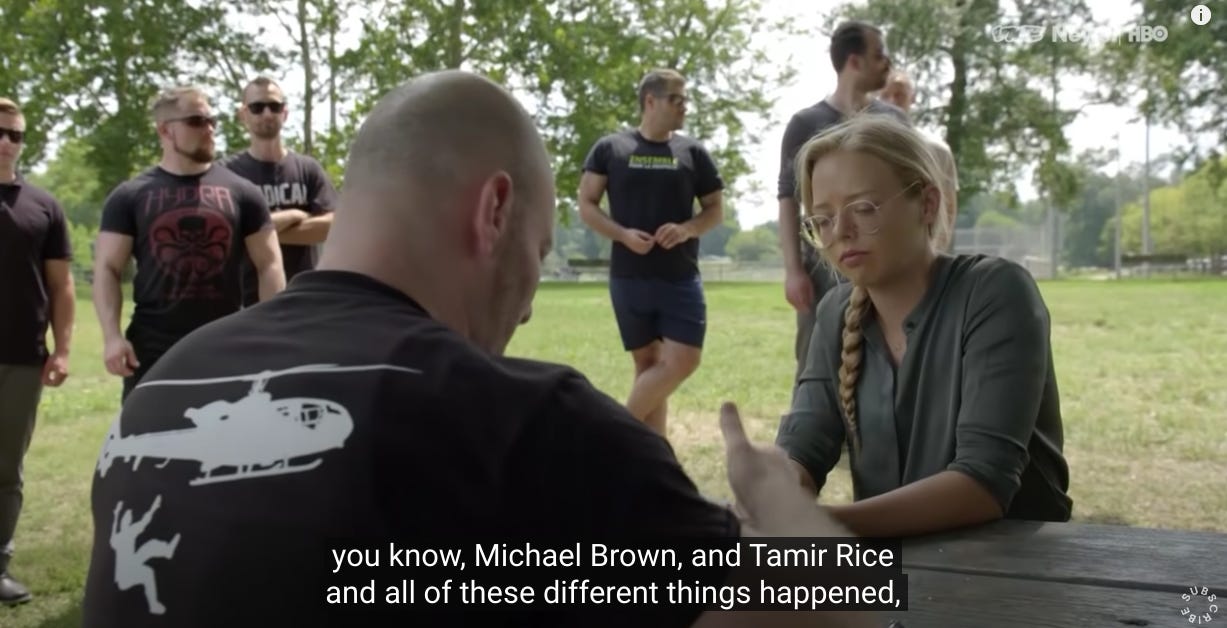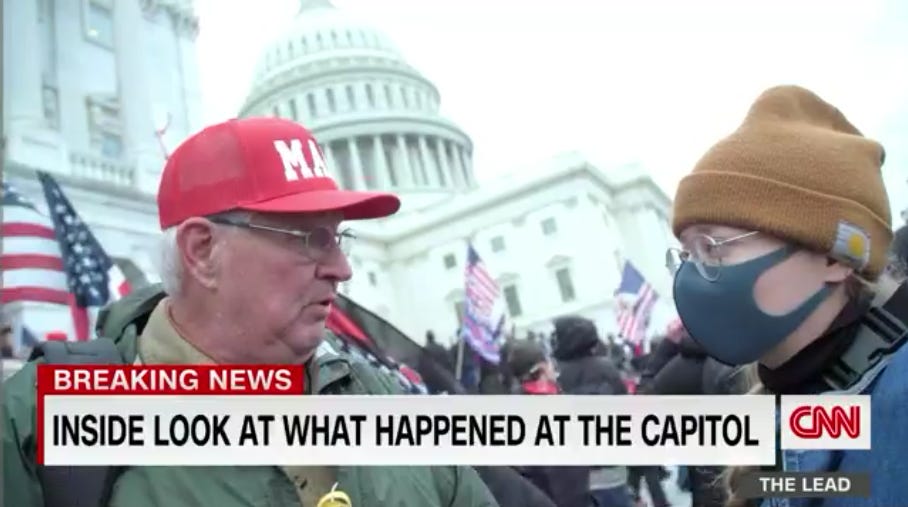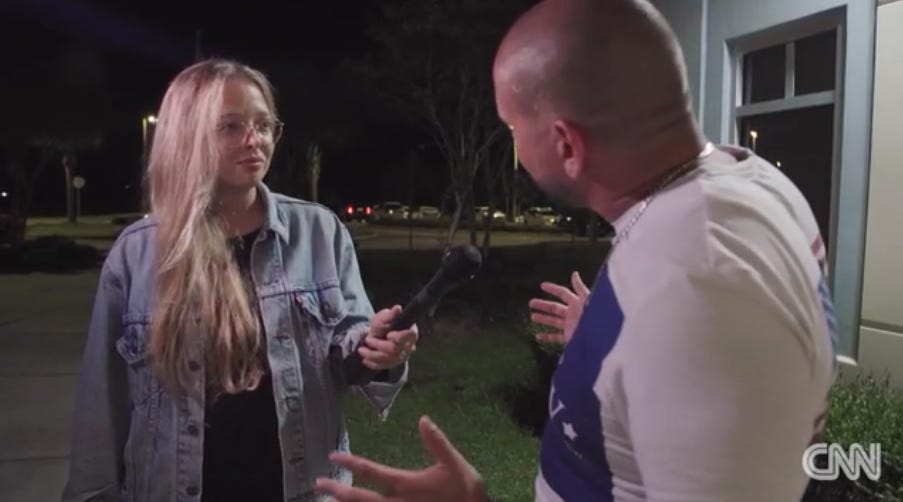Hi, hello! You’re currently a ✨free✨ subscriber to Links I Would Gchat You If We Were Friends, a digital culture newsletter for people who miss the old internet. This newsletter is more-or-less my full-time job, but I put very little behind the paywall in an effort to keep it accessible for everyone who reads it. If you’d like to support this work, please consider a paid subscription. Thanks very much, and enjoy this week’s edition! How the darkest corners of the internet took over U.S. politicsCNN correspondent Elle Reeve talks Nazis, tradwives, Gamergate and her (surprisingly hopeful!) take on the presidential electionI was honestly and uncharacteristically nervous to interview Elle Reeve. My primary professional takeaway from her new book, Black Pill: How I Witnessed the Darkest Corners of the Internet Come to Life, Poison Society, and Capture American Politics, is that Reeve herself is something of an interview savant. Over the past 10+ years, the current CNN and former Vice News correspondent has somehow persuaded dozens of white nationalists, far-right extremists and other media-shy unsavories to repeatedly and self-detrimentally spill their guts. This is the second installment of Gamergate @ 10, a month-long retrospective on the legacy of one of the worst and most pivotal events in modern internet culture. You can read the first installment, and more about the project, here. Comments on this series are limited to paid subscribers, who made it possible for me to devote lots of extra time to reporting this pieces and recruiting guests. If you’d like to support this and other Links projects, please consider upgrading your subscription. At one point in Black Pill, Reeve recounts a stilted, at-home interview she conducted with Matt Parrott, a far-right agitator and organizer of the 2017 Unite the Right rally in Charlottesville. To get Parrott to open up, Reeve resorts to what she calls one of her “favorite” interview questions: asking Parrott if he was left-handed. He was left-handed, and the gambit works. Parrott goes on to tell Reeve he was diagnosed with an autism spectrum disorder as a child. (People with autism are more likely to be left-handed, Reeve explains, so in certain settings the question functions like a “secret password.”) The left-handed trick, which blew this lefty’s mind, is just one of the myriad insights Reeve’s collected in her decade reporting from the political and online fringe. Over the course of 250 pages, she lays out how the marriage of chan culture and old-school white supremacy metastasized into the extremist movement that eventually gave us Charlottesville and January 6. Gamergate — the sprawling harassment-campaign-slash-culture-war that began 10 years ago this month — also figures prominently in that narrative. “Every white nationalist I’ve spoken to has told me that Gamergate changed the white power movement,” Reeve writes, in part by handing the movement a fertile recruitment grounds. A strain of virulent misogyny also continues to animate far-right politics. “These are alienated young men who don't have a lot of friends, and they want a woman at their side to project status to other men,” Reeve said. (It probably goes without saying that, despite my initial intimidation, Reeve was both smart and enormously cool in conversation.) Below, we discuss Nazis, tradwives, Gamergate, the far-right’s comical obsession with being hot and Reeve’s (surprisingly?) hopeful predictions for the U.S. presidential election. This interview has been edited for length, flow and clarity. Please enjoy it! You are maybe the foremost reporter on the U.S. far-right, a job that … many people would not envy! Can you tell me how you got started on this very particular, and very difficult, beat? Elle: Yeah, absolutely. So it goes back to this cartoonist named Ben Garrison, if you’re familiar with him. The first Ben Garrison cartoon I saw depicted Trump as this macho man dancing with a sexy America. I've always been obsessed with masculinity and the presidential election, and I wanted to know more about this guy, Garrison. So I searched him, and the results are all Nazi stuff. It looks like he's a total Nazi. But it turns out that he had been the victim of a character assassination campaign by 4chan [… the lawless, anonymous message board that has since been tied to a long string of violent incidents]. I went on 4chan to research Garrison, and it happened to be the same day in 2016 that Microsoft released an AI chatbot called Tay. So I was watching live as 4chan realized they could manipulate her, and as they got this Microsoft chatbot to say she supported Hitler. I remember thinking that it was huge, that there were so many people. And they weren’t the stereotype of someone in Alabama in a trailer park who's racist. These were young, internet-savvy people who were neo-Nazis, essentially. I’m fascinated by how quickly you identified the significance of this online culture. Because for an astoundingly long time, the powers-that-be — certainly in media — felt that these people were jokers or these people were losers, and they didn’t want to acknowledge them. What tipped you off that the channers were, in fact, a serious and potentially dangerous movement? Elle: Well, for one thing, one of them emailed me — and it was very clear from our correspondence that he was not being ironic, that he truly believed these things. I also always thought racism was a bigger part of our politics than most people wanted to admit. I was born in downtown Atlanta and grew up there until middle school, when my family moved to small-town Tennessee. In Atlanta, history class culminates with the civil rights movement. But in my small-town Tennessee history class, it culminated with the Civil War. In Atlanta, our school principal announced over the loudspeaker that they would no longer fly the Georgia state flag as long as it had the Confederate flag on it. In Tennessee, the Confederate flag was “heritage, not hate” and defended as a decent symbol for decent people to display. So I always had this sense of there being different versions of American history, and I think that experience gave me an ability to see racism among white people in a way that, if I had just been born in a small town or if I’d just been in Atlanta, I wouldn't have seen as clearly. I wanted to ask you a bit about your technique as an interviewer and how you approach far-right sources. In many cases, these people react with anger or all-out hatred — they despise the media, and they might say they despise you personally, but you still get them to talk to you, often against their own interests. How do you persuade those people to speak to you? Elle: It's funny. I was very frustrated because I got a lot of feedback after Charlottesville that I only got those interviews because I was a blonde lady. It really made me mad. In reality, when I’m in doubt, or when I’m feeling shaken, I'm essentially doing an impression of my dad. My dad was this very charming Southern guy with ever-so-slightly old school manners, and I tap into that way of being when I'm in a more rural place or I'm with a more conservative audience. It reads as more familiar and non-threatening to them.
When we're talking about extremists, like white nationalists, those people are largely hated by society. Even a person who has racist beliefs still hates Nazis. So very simple courtesies, like saying please and thank you, thanking them for their time, really goes a long way. I also let people talk for a really long time on the phone, and that's why recording is so helpful — because sometimes I can't even sustain that much attention for that long. Sometimes I would call these guys and they would be extremely hostile and say things like, “I don't want to talk to the Jewish media” or whatever. But then an hour and a half later, I'm the one who's saying, “Okay, listen, I really gotta go. I gotta go live my life. It's late.” Do you get the sense, when you're having these really in-depth, vulnerable, repeat interviews with people — and when, despite their many monstrous beliefs or whatever else, their humanity is emerging to you — is your humanity emerging to them, as well? Do they have a sense of you as an individual? Elle: Yes and no — it kind of depends on the person. I have to force it, essentially. The stereotype in their world is that journalists are born very wealthy and went to very fancy schools. We’ve never had our ideas challenged, never had a problem or a tragedy in our lives — that's their picture of who journalists are. When I'm able to subvert their expectations, then I do sometimes get more interesting responses or they trust me more. I used to never reveal any personal information at all, because I thought they would weaponize it against me. But I eventually found it works better the other way, to force them to think of me as a person. Then they listen to my questions more thoughtfully. Misogyny is a thread that runs through the book and through the white nationalist movement — whether directed at you, as a journalist and a human, or at some of the female members you interview. I was hoping we could talk about Gamergate for a minute. There’s this really striking line: “Every white nationalist I've spoken to has told me that Gamergate changed the white power movement.” How specifically do the people you’ve spoken with believe that Gamergate helped them? Elle: Before Gamergate — and for a few years before Gamergate, going back to the George W. Bush era — the white nationalist movement was essentially dead. On one side were the elite fancy guys, who were maybe old professors or people who’d been fired from National Review, and they’d write their little papers and hold their conferences and nothing really happened. Then there were these working-class, neo-Nazi skinhead types. The two didn’t mix and they didn’t have a lot of reach. But when Gamergate happens, that's when the white nationalists truly start understanding the power of the internet and social media. They had been online before. But Gamergate is a reaction against the push for more diversity in the video games industry: less giant boobs jiggling in games, more women video game designers, that kind of thing. One Gamergater basically told me, “we white men made video games what they are, and we made the industry what it is. Why don’t we get the most say in what it becomes and how it changes?” [Editor’s note: Elle didn’t point this out explicitly, but this attitude pretty directly mirrors white nationalist rhetoric.] So this becomes a huge frenzy, especially on 8chan [a descendant of 4chan, which allowed Gamergate discussion even after 4chan banned it]. Stormfront, which is an old-school, sort of working class white nationalist message board, starts raiding 4chan and 8chan because they realize that’s where the energy is. The whole culture of the alt-right develops in these spaces where you see a marriage of trolling culture and anonymous mayhem with white nationalism. Richard Spencer himself told me that young guys had come up to him and said “I started reading eugenicist stuff or antisemitic stuff in order to be a better troll — and in the process, I red-pilled myself.” So, the way Spencer describes it, it started as a joke and then became real. That doesn’t mean it’s less dangerous. After that, you get this much more middle-class-looking right-wing movement. I think there's an assumption among most people — a pretty logical assumption! — that white nationalism is about race. But so much of it is also about gender. Elle: Yeah, there’s this preoccupation with breeding babies. And these are alienated young men who don't have a lot of friends, and they want a woman at their side to project status to other men. It's not about seeking love. It's about looking like you've got your shit together and like a woman would find you attractive and you are able to dominate a woman. That’s what a lot of the women who’ve quit the movement say the men in it want — a stereotypical, submissive wife to make them look good in front of their friends. And then men very much want to be hot, also. The men becoming hot is critical to the movement. Some of the groups that are still active, like Patriot Front, they meet up and do push-ups and stuff together. And if a public event goes poorly, the mass anonymous posters get angry at their leaders for not being more attractive. There's this term, “Chad nationalist,” that you can still find on Twitter sometimes — it describes this archetypal hot guy who, you know, gets all the women for racism. I’m curious what you make of the whole “tradwife” phenomenon, given what you’ve seen in white nationalist circles. Elle: I first heard of tradwives on 4chan in 2016. Now you see it in The New York Times — like, what? I don't know. It's unsettling. I don't want to make the claim that everyone who adopts these aesthetics on their social media account is a Nazi or something. I don't know that. Who knows how they actually live. I don't have any evidence of that, and I haven't interviewed them. But all of this trad stuff that I saw happening in 2016 and 2017 — it reached a point that it was even concerning within the white nationalist movement. Nathan Damigo, who was part of Identity Evropa, sent an edict to the women’s coordinator of the group, Samantha Froelich, saying “no more bonnets.” She had to tell the women not to wear bonnets anymore. No more trad LARPing, because it got too weird for them … and they were the pioneers of this tradwife stuff. To then see it on TikTok, or profiled in The New York Times, that’s crazy to me. On the subject of who and what news organizations write about, there’s a raging debate around this idea of “platforming” and the concern that any time you cover a person or group on the far-right, you’re also amplifying or empowering them. You reject that argument really forcefully. Can you talk a bit about how you think of platforming in your work? Elle: Yeah, I’ve encountered that kind of scolding. But pretending something doesn’t exist doesn’t make it go away. QAnon is such a perfect example — we weren’t tracking the leaders or anything, at least not in the mainstream media. Then we got January 6 and people were surprised. But there had been massive public demonstrations in D.C. and all over the country, just massive demonstrations. Why didn’t ignoring it work?
So one, people need to know this is happening. Two, getting people on the record, on camera, becomes important in other ways. Here’s a perfect example: I was covering the federal trial of all the main organizers of the Charlottesville rally, where they played a clip of my documentary three or four times, and when I went outside, this anti-fascist woman started screaming at me about platforming. “No one wants to hear my platforming.” I was like, “are you not watching this trial? Because clearly the plaintiffs want to hear my reporting very badly.” They all have their own media ecosystem, too, so even if we did achieve total radio silence on white nationalists or QAnon or whatever, they would never notice. They're not watching us. They're on Rumble or DLive or Telegram or whatever. It does seem like that viewpoint presumes we're still existing in some kind of 1980s monoculture, which could not be further from the world or internet we live in. Elle: It's just not reality. I remember, a couple years ago, a source sent me a link to something called Follow the Cabal. It’s this supposed documentary in 10 segments on DLive that weaves together the Protocols of the Elders of Zion with anti-Covid conspiracy theories and the JFK assassination and all this other stuff. And there's this whole conspiracy theory about how Trump is coming to bring justice to this dastardly satanic cabal. Everyone I interviewed on Jan. 6 had seen it. Everyone. It was crazy. And this wasn't even on YouTube — it was on some third-rate video platform where you can't even watch an hour-long video in one segment. I almost hesitate to ask, but, one last question: How are you feeling looking ahead to the presidential election? Elle: Let me first say this — when Trump was shot, I was afraid that there would be a violent backlash, and there wasn't. I've really thought about that. I'm very, very glad, obviously. It also made me think about my assumptions about the American people and how I had maybe underestimated them. The second thing is, there are definitely people with authoritarian ideas who are trying very hard to gain power within the Trump world and within the conservative intellectual space. And that is really concerning. Peter Thiel, Elon Musk — they've all made these public statements about shifting the Overton window on democracy. But that said, most people don’t support that. Most people are not very online, to start with, and then they’re also just not into this.
Last fall, I was reporting on these school board fights in Florida over banning books. Moms for Liberty had gotten this law passed that made it really easy to ban books by staging these spectacles at school board meetings: If you read the sexy part of a book out loud, and the school board told you to stop, then the book could immediately be banned. But I went to several meetings, and there was a huge number of people who turned out against that. All different kinds of people — not just New Yorker readers, not just fancy people, but working-class people and people who had interracial families and people from all walks of life who felt this had gone too far. And then in the school board elections last year, Moms for Liberty candidates largely lost. So that's the kind of thing I look to. Basically, I'm saying I have faith in the normies. America is not going to turn into what the online left wants it to be in a single election. But the average person doesn't want authoritarianism — and there's a massive reaction against that. You’re currently a free subscriber to Links I Would Gchat You If We Were Friends. Upgrade your subscription to support this project and get the full experience. Paywall policy • Instagram • Threads • Send me a coffee • Referral program |





